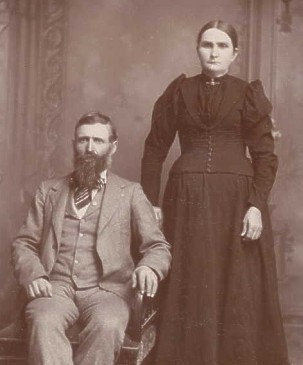Settler Jacob Miller
Listen, little Lorraine village,
Little French town, bombed and roofless,
Listen to people born in dugouts, sod,
And log house, shed and lean-to.
Listen to the Millers' story,
Joined with Gastons, now, and Behrends,
Caudwells, Eubanks, Rhodes, and McLavey.
They are Jacob Miller's families.
He who came before old Morgan,
Made the town out of a farm.
Their first home on rolling prairie,
Their first parlor, bedroom, bath,
Was the wagon that they came in,
Like the covered wagon yonder.
All their shelter from the north wind,
All their shade beneath our sun,
All between them and the hard rains.
This is how their home began.
"Unhitch the team now - we are home.
Put a stone against the wheel;
Roast the sage hen on a campfire;
Take the big tub down and wash."
This was Annie Miller's story,
Friend of Helen and Lucinda,
Friends of Andersons and Silvers.
Bread and milk and roof are vital.
But in such a covered wagon
Driven from our history.
Annie Miller had a baby.
John was born - You all have known him -
In a wagon in the night.
Listening prairie dogs heard first-cries.
Stars stood close to one another.
Gertrude, we salute your mother!
Comment
Again, Carson draws a parallel between the citizens of Fèves and Morganville.
Now comes the story of settler Jacob Smith Miller and wife Anna Gilson. Child Hattie married William Gaston,
John married Anna Behrends, Perry married Patience Caudwell, Gertrude married Charles Eubanks, Charles married
Margaret Rhodes, and Mary married Ben McLavey.
Page 3 of Carson's notebook indicates there was to be a covered wagon. It was probably visible at this point.
Carson notes that the wagon was initially the family's only shelter.
Some wagons had a brake that required the driver to hold it on. Once stopped, a rock was placed next to the wheel to keep
the wagon from moving.
John died in 1945.


